Et Tu, Brute? Haiti’s Betrayal By Latin America | Et Tu, Brute? Traição do Haiti pela América Latina
By Dady Chery
Haiti Chery
English | Portuguese
For the 10th year since the forcible removal of elected Haitian President Jean-Bertrand Aristide from Haiti, the United Nations has renewed the mandate of an occupying “peacekeeping force” in the country. The unanimous vote about Haiti happened in an October 14, 2014 meeting of the Security Council that took less than 25 minutes.
The UN’s occupation of Haiti with its (de)Stabilization Mission (Mission des Nations Unies pour la Stabilisation en Haïti, MINUSTAH) is not merely due to the high-handed decisions of its Security Council. At a meeting of the General Assembly on May 7, 2014, for example, when the Secretary General proposed a reduction of MINUSTAH’s yearly budget from $575.89 to $511.31 millions, Brazil proposed that the UN troops should be replaced with UN law enforcement for the same budget. Guatemala argued that the higher sum would be needed to support MINUSTAH’s “essential role in helping Haiti hold legislative and local elections expected later this year,” and Haiti’s representatives said that MINUSTAH could not withstand this 11.2 percent budget reduction because of its need for “a well-balanced budget to fight cholera, among other challenges.” The disparity between Haitian public opinion, which has for years demanded an immediate and total removal of MINUSTAH, and the statements of its politicians is to be expected. Haiti’s representatives were, after all, installed in UN-sponsored elections that excluded the Fanmi Lavalas party and 80 percent of the electorate.
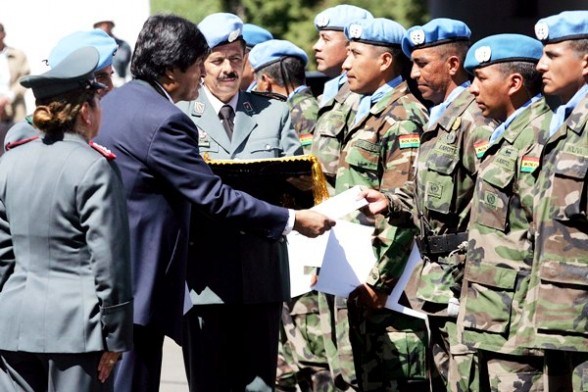 For their repression of Haitians, Brazil and Guatemala expect, not only prestige on the world scene, but also a significant chunk of MINUSTAH’s massive yearly budget. Other Latin-American occupiers of Haiti with similar aspirations include Argentina, Bolivia, Chile, Colombia, Ecuador, El Salvador, Honduras, Paraguay, Peru, and Uruguay. The behavior of these countries’ heads of state is in accord with the expectations of Niccolo Machiavelli, who wrote in The Prince that one should expect the worst treatment from those whom one has helped, because no one wants to reminded of a time when they needed to be helped.
For their repression of Haitians, Brazil and Guatemala expect, not only prestige on the world scene, but also a significant chunk of MINUSTAH’s massive yearly budget. Other Latin-American occupiers of Haiti with similar aspirations include Argentina, Bolivia, Chile, Colombia, Ecuador, El Salvador, Honduras, Paraguay, Peru, and Uruguay. The behavior of these countries’ heads of state is in accord with the expectations of Niccolo Machiavelli, who wrote in The Prince that one should expect the worst treatment from those whom one has helped, because no one wants to reminded of a time when they needed to be helped.
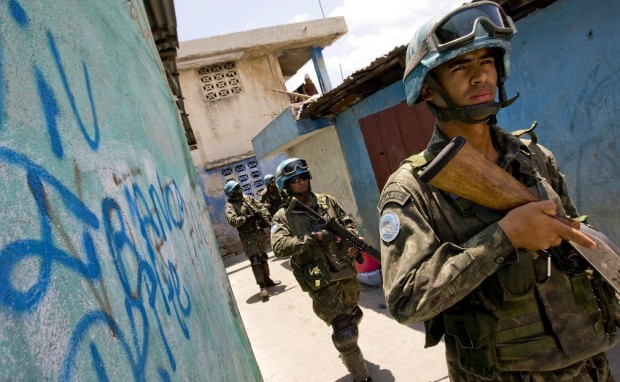 Indeed, without Haiti’s help, there would not have been any independent country in Latin America. On January 1, 1816, when Simon Bolivar arrived in Haiti, downtrodden and desperate for help to fight the Spanish, the only two republics in the Western Hemisphere were the United States, where slave ownership was in force, and Haiti, which had fought for and earned its independence from France, Spain, and the United Kingdom in what is still the only successful slave rebellion ever in the world. Bolivar had been beaten by a massive Spanish expedition in his attempt to free the northern regions of South America. He had been refused help by the British in Jamaica. Before Bolivar, only two years after Haitian Independence, the Venezuelan revolutionary Francisco Miranda had sought and received help from Haitian founding father Jean-Jacques Dessalines; Miranda had left in February 1806 carrying, among other things, a Venezuelan flag that had been designed in Jacmel, Haiti. Bolivar came to Haiti to seek an audience with President Alexandre Petion. Petion agreed to see him the next day.
Indeed, without Haiti’s help, there would not have been any independent country in Latin America. On January 1, 1816, when Simon Bolivar arrived in Haiti, downtrodden and desperate for help to fight the Spanish, the only two republics in the Western Hemisphere were the United States, where slave ownership was in force, and Haiti, which had fought for and earned its independence from France, Spain, and the United Kingdom in what is still the only successful slave rebellion ever in the world. Bolivar had been beaten by a massive Spanish expedition in his attempt to free the northern regions of South America. He had been refused help by the British in Jamaica. Before Bolivar, only two years after Haitian Independence, the Venezuelan revolutionary Francisco Miranda had sought and received help from Haitian founding father Jean-Jacques Dessalines; Miranda had left in February 1806 carrying, among other things, a Venezuelan flag that had been designed in Jacmel, Haiti. Bolivar came to Haiti to seek an audience with President Alexandre Petion. Petion agreed to see him the next day.
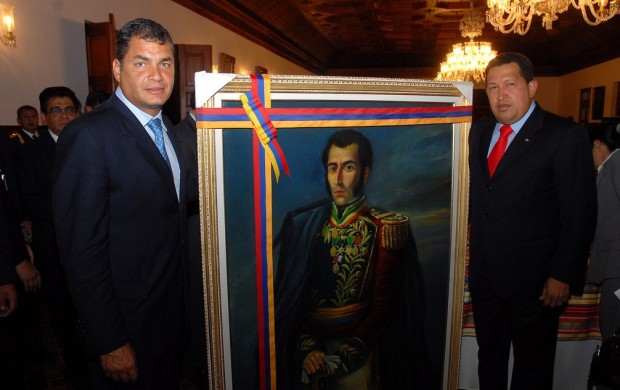 When the two men met, Petion was 46 years old and had already twice been reelected President of a republic of former slaves. By contrast, Bolivar was 33 and had once been a rich plantation and slave owner. Petion asked Bolivar: “How can you found a republic where slavery exists?” He agreed to help Bolivar on condition that all slaves would be freed in the liberated areas. The pact between these two major historical figures, almost half a century before Abraham Lincoln’s Emancipation Proclamation, was necessarily secret because Haiti’s assistance would have been considered an act of war by the United States and Spain. Petion gave Bolivar and his men food and shelter for three months in Haiti. He also built cohesion among Bolivar’s officers and prevented at least one rebellion that would have caused the loss of a ship. Among other things, he forbade the ship’s use for any attack not approved by Bolivar, and he generally warned the men that those who did not follow Bolivar’s leadership would be forced to stay in Haiti and not join the expedition.
When the two men met, Petion was 46 years old and had already twice been reelected President of a republic of former slaves. By contrast, Bolivar was 33 and had once been a rich plantation and slave owner. Petion asked Bolivar: “How can you found a republic where slavery exists?” He agreed to help Bolivar on condition that all slaves would be freed in the liberated areas. The pact between these two major historical figures, almost half a century before Abraham Lincoln’s Emancipation Proclamation, was necessarily secret because Haiti’s assistance would have been considered an act of war by the United States and Spain. Petion gave Bolivar and his men food and shelter for three months in Haiti. He also built cohesion among Bolivar’s officers and prevented at least one rebellion that would have caused the loss of a ship. Among other things, he forbade the ship’s use for any attack not approved by Bolivar, and he generally warned the men that those who did not follow Bolivar’s leadership would be forced to stay in Haiti and not join the expedition.
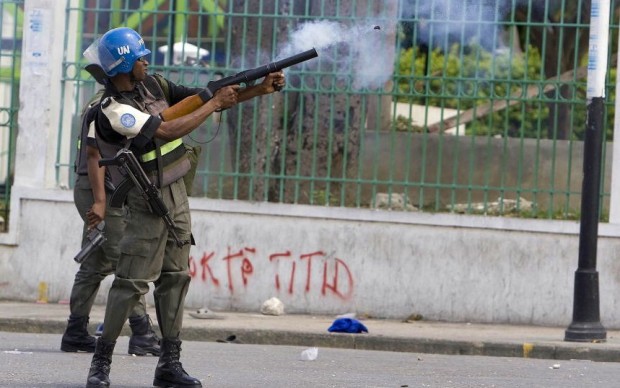 Bolivar left Haiti on March 31, 1816 with plans to take Venezuela. He had with him about 250 men, most of them officers, and he was outfitted by Petion with a small fleet, a printing press for propaganda, and weapons for 6,000 men, including 4,000 muskets and 15,000 pounds of gunpowder, plus money and food. After a disastrous six-month campaign, some of which was blamed on Bolivar’s tactical mistakes due to a reckless appetite for women even in the midst of his battles, he returned to Port-au-Prince, Haiti. Petion, who had just been elected President of Haiti for Life, helped Bolivar once again to recover and organize his most loyal officers. This time he supplied Bolivar not only with materials but also with Haitian soldiers. According to Bolivar’s later writings, “This group of Haitians that faced down 10,000 European tyrants numbered 300 men.” This second expedition left for Venezuela on December 21, 1816. Bolivar’s campaign would be tortuous, but ultimately he would win independence for an area that includes modern-day north-west Brazil, Guyana, Venezuela, Ecuador, Colombia, Panama, northern Peru, Costa Rica, Nicaragua, and Bolivia. As promised to Petion, Simon Bolivar declared slavery to be abolished in his territories.
Bolivar left Haiti on March 31, 1816 with plans to take Venezuela. He had with him about 250 men, most of them officers, and he was outfitted by Petion with a small fleet, a printing press for propaganda, and weapons for 6,000 men, including 4,000 muskets and 15,000 pounds of gunpowder, plus money and food. After a disastrous six-month campaign, some of which was blamed on Bolivar’s tactical mistakes due to a reckless appetite for women even in the midst of his battles, he returned to Port-au-Prince, Haiti. Petion, who had just been elected President of Haiti for Life, helped Bolivar once again to recover and organize his most loyal officers. This time he supplied Bolivar not only with materials but also with Haitian soldiers. According to Bolivar’s later writings, “This group of Haitians that faced down 10,000 European tyrants numbered 300 men.” This second expedition left for Venezuela on December 21, 1816. Bolivar’s campaign would be tortuous, but ultimately he would win independence for an area that includes modern-day north-west Brazil, Guyana, Venezuela, Ecuador, Colombia, Panama, northern Peru, Costa Rica, Nicaragua, and Bolivia. As promised to Petion, Simon Bolivar declared slavery to be abolished in his territories.
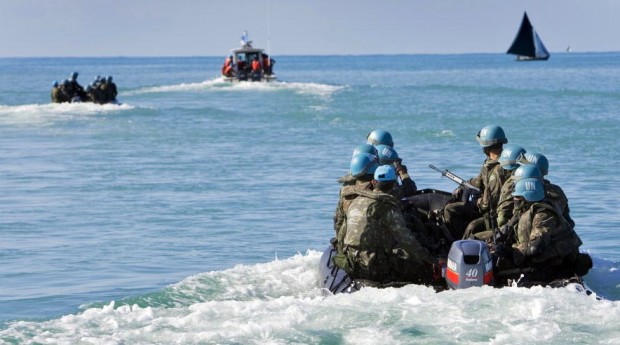 This is where the narrative about Petion and Bolivar usually ends, and it is a great story if one believes in fairy tales. Latin America does not like to be reminded that its great liberator, Simon Bolivar, never formally recognized the Republic of Haiti and never sent any diplomatic representative of his new government to our island republic. In 1826, for the first meeting of the independent states of the Americas, i.e. the Congress of the American States in Panama, Bolivar invited United States President John Quincy Adams, a proponent of the Monroe Doctrine and supporter of the slave trade, but he excluded Haiti.
This is where the narrative about Petion and Bolivar usually ends, and it is a great story if one believes in fairy tales. Latin America does not like to be reminded that its great liberator, Simon Bolivar, never formally recognized the Republic of Haiti and never sent any diplomatic representative of his new government to our island republic. In 1826, for the first meeting of the independent states of the Americas, i.e. the Congress of the American States in Panama, Bolivar invited United States President John Quincy Adams, a proponent of the Monroe Doctrine and supporter of the slave trade, but he excluded Haiti.
 Ironically, current-day occupiers of Haiti from the regions that had been freed by Bolivar like to recall the “glorious relationship of Bolivar and Petion,” as if this could hypnotize Haitians and ever be a distraction as these occupiers continue a tradition of betrayal. Venezuela does not participate in MINUSTAH, but it is helping the current Haitian regime to build villas on Ile a Vache, an offshore island that the regime’s ministry of tourism is trying to expropriate forcibly from its residents. Leaders of countries like Bolivia, Ecuador and Uruguay present themselves as being independent and anti-imperialistic, yet they do as the US says, as per tradition. All supply MINUSTAH with “peacekeeping troops.”
Ironically, current-day occupiers of Haiti from the regions that had been freed by Bolivar like to recall the “glorious relationship of Bolivar and Petion,” as if this could hypnotize Haitians and ever be a distraction as these occupiers continue a tradition of betrayal. Venezuela does not participate in MINUSTAH, but it is helping the current Haitian regime to build villas on Ile a Vache, an offshore island that the regime’s ministry of tourism is trying to expropriate forcibly from its residents. Leaders of countries like Bolivia, Ecuador and Uruguay present themselves as being independent and anti-imperialistic, yet they do as the US says, as per tradition. All supply MINUSTAH with “peacekeeping troops.”
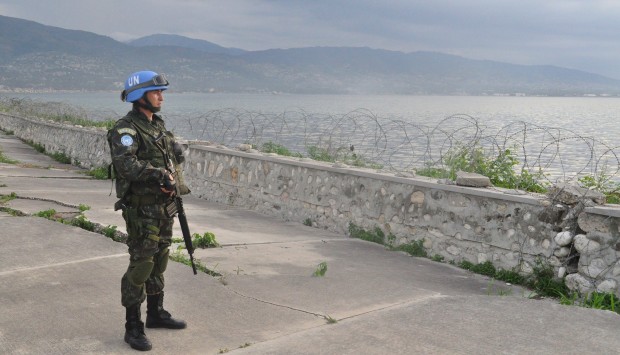 Like any other occupation force, the UN troops harass, shoot, prostitute, infect and rape as a matter of routine. Moreover, they do so under cover of UN immunity. For example, in 2011, five Uruguayan troops raped a Haitian boy, Johnny Jean and, with their government’s complicity, they got away with their crime despite having videotaped it. Likewise, Argentinian, Brazilian, and Chilean (ABC) troops have faced no criminal charge for their massacres of thousands of Aristide partisans, some of which is immortalized on videotape. Ecuador has sung praises to Petion even as it embraced Michel Martelly and offered to train his army and paramilitary police. Of all the group, Brazil has been the most shameful in testing new military hardware in Haiti and making a lucrative business of training “peacekeepers” for deployment in Haiti, precisely because Haitians mistakenly consider themselves to be at peace. In addition, Brazil has secured Haitian reconstruction contracts for its more corrupt industries and trafficked Haitian nationals to work with its worst employers in an arrangement that amounts to slavery.
Like any other occupation force, the UN troops harass, shoot, prostitute, infect and rape as a matter of routine. Moreover, they do so under cover of UN immunity. For example, in 2011, five Uruguayan troops raped a Haitian boy, Johnny Jean and, with their government’s complicity, they got away with their crime despite having videotaped it. Likewise, Argentinian, Brazilian, and Chilean (ABC) troops have faced no criminal charge for their massacres of thousands of Aristide partisans, some of which is immortalized on videotape. Ecuador has sung praises to Petion even as it embraced Michel Martelly and offered to train his army and paramilitary police. Of all the group, Brazil has been the most shameful in testing new military hardware in Haiti and making a lucrative business of training “peacekeepers” for deployment in Haiti, precisely because Haitians mistakenly consider themselves to be at peace. In addition, Brazil has secured Haitian reconstruction contracts for its more corrupt industries and trafficked Haitian nationals to work with its worst employers in an arrangement that amounts to slavery.
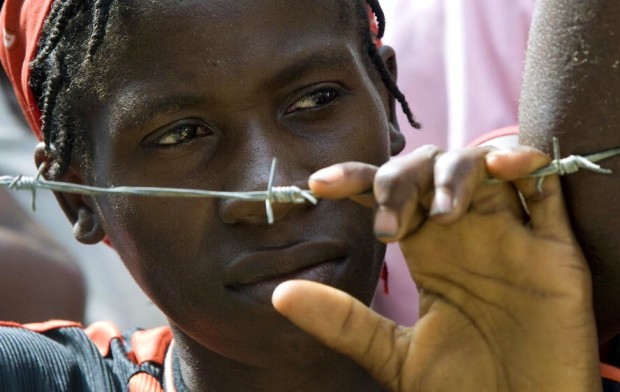 As Latin America contributes to UN occupation forces in Haiti and elsewhere, it is amassing a repressive army away from the prying eyes of its citizens. The size of this army is unprecedented; it can be activated at a moment’s notice against its home population, and it is loyal mainly to multinational corporations. As this army continues to grow, the so-called Latin-American democracies are becoming nothing more than banana republics with figurehead elected leaders and a powerful military that calls all the shots. We, Haitians, have no choice but to continue our revolution and follow Dessalines’ admonitions to: “Vow before me to live free and independent, and to prefer death to anything that will try to place you back in chains. Swear, finally, to pursue forever the traitors and enemies of your independence.” By denying Haiti, pretending that Haitian independence never happened and trying to destroy Haiti’s slave revolution, Latin America cannot become more powerful on the world scene, it can only lose its way and Haiti’s great gift of independence.
As Latin America contributes to UN occupation forces in Haiti and elsewhere, it is amassing a repressive army away from the prying eyes of its citizens. The size of this army is unprecedented; it can be activated at a moment’s notice against its home population, and it is loyal mainly to multinational corporations. As this army continues to grow, the so-called Latin-American democracies are becoming nothing more than banana republics with figurehead elected leaders and a powerful military that calls all the shots. We, Haitians, have no choice but to continue our revolution and follow Dessalines’ admonitions to: “Vow before me to live free and independent, and to prefer death to anything that will try to place you back in chains. Swear, finally, to pursue forever the traitors and enemies of your independence.” By denying Haiti, pretending that Haitian independence never happened and trying to destroy Haiti’s slave revolution, Latin America cannot become more powerful on the world scene, it can only lose its way and Haiti’s great gift of independence.
UPDATES
UPDATE #1. January 30, 2016. A delegation from the Organization of American States (OAS) will visit Haiti on Sunday, January 31, 2016. Another group from the Community of Latin American and Caribbean States (CELAC) — a supposedly more enlightened version of OAS, without the US and Canada, that has coddled Martelly for years — is also on its way. They have become desperate to find a supposed Haitian solution to the electoral impasse, since Haitians scuttled the OAS-legitimized fraudulent elections and started to make their own plans. Recall that the head of the OAS election observation mission, Celso Amorim, was a major engineer of Brazil’s participation in the United Nations occupation of Haiti in 2004 in the first place.
The OAS, particularly its member-state Ecuador, where the fake leftist Rafael Correa aspires to be reelected president indefinitely, has trained a paramilitary army of Martelly-loyal Tontons Macoutes for Haiti without asking the opinion of Haitians. The real mission of the OAS will be to threaten Haiti with being declared a failed state: a bluff, of course. For one, this is the Hillary Clinton election year, and they cannot take a chance on what might happen next; for another, this would set a dangerous precedent for OAS members. Another OAS threat will be the deployment of its Ecuador-trained goons, as if there isn’t already a surplus of mercenaries in Haiti. Do these Latin-American hypocrites and lackeys of the US and France forget that they have already played the Praetorian Guard card in MINUSTAH? Basta!
Sources: Haiti Chery | News Junkie Post | Photographs one and five from the archives of the President of the Republic of Ecuador; two, eight and nine from Blog Do Planalto; four, six, seven and ten from United Nations Photo; three from APG Agencia; eleven by Ansel.
Por Dady Chery
Haiti Chery
inglês | português
Traduzido do inglês por Murilo Otávio Rodrigues Paes Leme
Pelo 10o. ano desde a remoção pela força do Presidente eleito haitiano Jean-Bertrand Aristide do Haiti as Nações Unidas renovaram o credenciamento de “força pacificadora” ocupadora no país. A votação unânime relativa ao Haiti aconteceu numa reunião do Conselho de Segurança em 14 de outubro de 2014 que durou menos de 25 minutos.
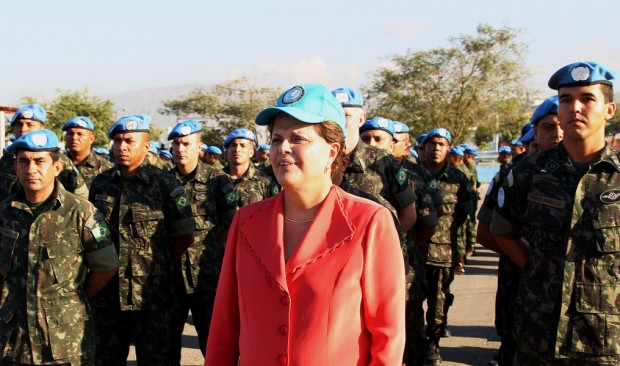 A ocupação do Haiti pelas Nações Unidas com sua Missão de Estabilização (Mission des Nations Unies pour la Stabilisation en Haïti, MINUSTAH) não se deve meramente às decisões despóticas de seu Conselho de Segurança. Em reunião da Assembleia Geral em 7 de maio de 2014, por exemplo, quando o Secretário Geral propôs redução do orçamento anual da MINUSTAH de $575.89 para $511.31 milhões, o Brasil propôs que os soldados das Nações Unidas fossem substituídas por agentes da lei das Nações Unidas com o mesmo orçamento. A Guatemala argumentou que a soma mais alta seria indispensável para apoiar o “papel essencial [da MINUSTAH] em ajudar o Haiti a manter eleições legislativas e locais esperadas para mais adiante este ano,” e os representantes do Haiti disseram que a MINUSTAH não poderia suportar essa redução orçamentária de 11.2 por cento por causa da necessidade de “orçamento equilibrado para combater o cólera, entre outros desafios.” A disparidade entre a opinião pública haitiana, que há anos demanda remoção imediata e total da MINUSTAH, e as declarações de seus políticos é de esperar. Os representantes do Haiti foram, afinal de contas, eleitos em eleições patrocinadas pelas Nações Unidas que excluíram o partido Fanmi Lavalas e 80 por cento do eleitorado.
A ocupação do Haiti pelas Nações Unidas com sua Missão de Estabilização (Mission des Nations Unies pour la Stabilisation en Haïti, MINUSTAH) não se deve meramente às decisões despóticas de seu Conselho de Segurança. Em reunião da Assembleia Geral em 7 de maio de 2014, por exemplo, quando o Secretário Geral propôs redução do orçamento anual da MINUSTAH de $575.89 para $511.31 milhões, o Brasil propôs que os soldados das Nações Unidas fossem substituídas por agentes da lei das Nações Unidas com o mesmo orçamento. A Guatemala argumentou que a soma mais alta seria indispensável para apoiar o “papel essencial [da MINUSTAH] em ajudar o Haiti a manter eleições legislativas e locais esperadas para mais adiante este ano,” e os representantes do Haiti disseram que a MINUSTAH não poderia suportar essa redução orçamentária de 11.2 por cento por causa da necessidade de “orçamento equilibrado para combater o cólera, entre outros desafios.” A disparidade entre a opinião pública haitiana, que há anos demanda remoção imediata e total da MINUSTAH, e as declarações de seus políticos é de esperar. Os representantes do Haiti foram, afinal de contas, eleitos em eleições patrocinadas pelas Nações Unidas que excluíram o partido Fanmi Lavalas e 80 por cento do eleitorado.
 Por sua repressão dos haitianos, Brasil e Guatemala esperam não apenas prestígio no cenário mundial como, também, significativo naco do maciço orçamento anual da MINUSTAH. Outros ocupadores latino-americanos do Haiti com aspirações similares incluem Argentina, Bolívia, Chile, Colômbia, Equador, El Salvador, Honduras, Paraguai, Peru, e Uruguai. O comportamento dos chefes de estado desses países está em acordo com as expectativas de Machiavelli, que escreveu, em O Príncipe, que alguém deve esperar o pior tratamento por parte daqueles a quem ajudou, porque ninguém quer ser lembrado de um tempo quando precisava ser ajudado.
Por sua repressão dos haitianos, Brasil e Guatemala esperam não apenas prestígio no cenário mundial como, também, significativo naco do maciço orçamento anual da MINUSTAH. Outros ocupadores latino-americanos do Haiti com aspirações similares incluem Argentina, Bolívia, Chile, Colômbia, Equador, El Salvador, Honduras, Paraguai, Peru, e Uruguai. O comportamento dos chefes de estado desses países está em acordo com as expectativas de Machiavelli, que escreveu, em O Príncipe, que alguém deve esperar o pior tratamento por parte daqueles a quem ajudou, porque ninguém quer ser lembrado de um tempo quando precisava ser ajudado.
 Na verdade, sem a ajuda do Haiti, não teria havido qualquer país independente na América Latina. Em 1o. de janeiro de 1816, quando Simon Bolivar chegou ao Haiti, abatido e desesperado por ajuda para combater os espanhóis, as únicas duas repúblicas do Hemisfério Ocidental eram os Estados Unidos, onde vigia a propriedade de escravos, e o Haiti, que havia lutado e conseguido independência de França, Espanha e Reino Unido, naquela que ainda é a única rebelião de escravos bem-sucedida do mundo. Bolívar havia sido derrotado por maciça expedição espanhola numa tentativa de libertar as regiões do norte da América do Sul. Ajuda fora-lhe recusada pela Jamaica. Antes de Bolívar, apenas dois anos depois da Independência do Haiti, o revolucionário venezuelano Francisco Miranda havia buscado e recebido ajuda do pai fundador do Haiti Jean-Jacques Dessalines; Miranda havia-se ido em fevereiro de 1806 levando, entre outras coisas, bandeira venezuelana que havia sigo desenhada em Jacmel. Bolívar veio ao Haiti para buscar audiência com o Presidente Alexandre Petion. Petion concordou em vê-lo no dia seguinte.
Na verdade, sem a ajuda do Haiti, não teria havido qualquer país independente na América Latina. Em 1o. de janeiro de 1816, quando Simon Bolivar chegou ao Haiti, abatido e desesperado por ajuda para combater os espanhóis, as únicas duas repúblicas do Hemisfério Ocidental eram os Estados Unidos, onde vigia a propriedade de escravos, e o Haiti, que havia lutado e conseguido independência de França, Espanha e Reino Unido, naquela que ainda é a única rebelião de escravos bem-sucedida do mundo. Bolívar havia sido derrotado por maciça expedição espanhola numa tentativa de libertar as regiões do norte da América do Sul. Ajuda fora-lhe recusada pela Jamaica. Antes de Bolívar, apenas dois anos depois da Independência do Haiti, o revolucionário venezuelano Francisco Miranda havia buscado e recebido ajuda do pai fundador do Haiti Jean-Jacques Dessalines; Miranda havia-se ido em fevereiro de 1806 levando, entre outras coisas, bandeira venezuelana que havia sigo desenhada em Jacmel. Bolívar veio ao Haiti para buscar audiência com o Presidente Alexandre Petion. Petion concordou em vê-lo no dia seguinte.
 Quando os dois homens se encontraram, Petion estava com 46 anos e havia já sido reeleito Presidente de uma república de antigos escravos. Em contraste, Bolívar estava com 33 anos e havia sido, no passado, rico proprietário de lavoura trabalhada por escravos. Petion perguntou a Bolívar: “Como poderá você fundar uma república onde exista escravatura?” Concordou em ajudar Bolívar sob a condição de que todos os escravos fossem libertados nas áreas libertadas. O pacto entre essas duas grandes figuras históricas, quase meio século antes da Proclamação da Emancipação de Lincoln, foi necessariamente secreto porque a assistência do Haiti teria sido considerada ato de guerra por Estados Unidos e Espanha. Petion deu a Bolívar e aos homens dele comida e abrigo por três meses no Haiti. Também promoveu coesão entre os oficiais de Bolívar e impediu pelo menos uma rebelião que teria causado perda de um navio. Entre outras coisas, proibiu o uso do navio para qualquer ataque não aprovado por Bolívar, e advertiu de maneira geral os homens que aqueles que não aceitassem a liderança de Bolívar seriam forçados a ficar no Haiti e não se juntariam à expedição.
Quando os dois homens se encontraram, Petion estava com 46 anos e havia já sido reeleito Presidente de uma república de antigos escravos. Em contraste, Bolívar estava com 33 anos e havia sido, no passado, rico proprietário de lavoura trabalhada por escravos. Petion perguntou a Bolívar: “Como poderá você fundar uma república onde exista escravatura?” Concordou em ajudar Bolívar sob a condição de que todos os escravos fossem libertados nas áreas libertadas. O pacto entre essas duas grandes figuras históricas, quase meio século antes da Proclamação da Emancipação de Lincoln, foi necessariamente secreto porque a assistência do Haiti teria sido considerada ato de guerra por Estados Unidos e Espanha. Petion deu a Bolívar e aos homens dele comida e abrigo por três meses no Haiti. Também promoveu coesão entre os oficiais de Bolívar e impediu pelo menos uma rebelião que teria causado perda de um navio. Entre outras coisas, proibiu o uso do navio para qualquer ataque não aprovado por Bolívar, e advertiu de maneira geral os homens que aqueles que não aceitassem a liderança de Bolívar seriam forçados a ficar no Haiti e não se juntariam à expedição.
 Bolívar deixou o Haiti em 31 de março de 1816 com planos de tomar a Venezuela. Tinha consigo cerca de 250 homens, a maior parte deles oficiais, e foi equipado por Petion com pequena frota, impressora para propaganda, e armas para 6.000 homens, inclusive 4.000 mosquetes e 15.000 libras de pólvora. Depois de desastrosas campanha de seis meses, insucesso em parte atribuído a equívocos táticos de Bolívar por causa do apetite insaciável dele por mulheres, mesmo em meio a suas batalhas, ele retornou a Port-au-Prince, Haiti. Petion, que acabara de ser eleito Presidente Vitalício do Haiti, ajudou Bolívar mais uma vez a recuperar-se e a organizar seus mais leais oficiais. Dessa vez ele forneceu a Bolívar não apenas materiais mas também soldados haitianos. De acordo com escritos posteriores de Bolívar, “Esse grupo de haitianos que derrotou 10.000 tiranos europeus era formado de 300 homens.” Aquela segunda expedição partiu para a Venezuela em 21 de dezembro de 1816. A campanha de Bolívar seria tortuosa, mas finalmente ele garantiria independência para área que inclui, em nossos dias, o noroeste do Brasil, Guiana, Venezuela, Equador, Colômbia, Panamá, norte do Peru, Costa Rica, Nicarágua, e Bolívia. Como prometido a Petion, Simon Bolívar aboliu a escravidão em seus territórios.
Bolívar deixou o Haiti em 31 de março de 1816 com planos de tomar a Venezuela. Tinha consigo cerca de 250 homens, a maior parte deles oficiais, e foi equipado por Petion com pequena frota, impressora para propaganda, e armas para 6.000 homens, inclusive 4.000 mosquetes e 15.000 libras de pólvora. Depois de desastrosas campanha de seis meses, insucesso em parte atribuído a equívocos táticos de Bolívar por causa do apetite insaciável dele por mulheres, mesmo em meio a suas batalhas, ele retornou a Port-au-Prince, Haiti. Petion, que acabara de ser eleito Presidente Vitalício do Haiti, ajudou Bolívar mais uma vez a recuperar-se e a organizar seus mais leais oficiais. Dessa vez ele forneceu a Bolívar não apenas materiais mas também soldados haitianos. De acordo com escritos posteriores de Bolívar, “Esse grupo de haitianos que derrotou 10.000 tiranos europeus era formado de 300 homens.” Aquela segunda expedição partiu para a Venezuela em 21 de dezembro de 1816. A campanha de Bolívar seria tortuosa, mas finalmente ele garantiria independência para área que inclui, em nossos dias, o noroeste do Brasil, Guiana, Venezuela, Equador, Colômbia, Panamá, norte do Peru, Costa Rica, Nicarágua, e Bolívia. Como prometido a Petion, Simon Bolívar aboliu a escravidão em seus territórios.
 Este é o ponto em que a narrativa acerca de Petion e Bolívar usualmente acaba, e é uma grande história para quem acredita em contos de fadas. A América Latina não gosta de ser lembrada de que seu grande libertador, Simon Bolívar, nunca reconheceu formalmente a República do Haiti e nunca enviou qualquer representante diplomático de seu novo governo a nossa república em ilha. Em 1826, para a primeira reunião dos estados independentes das Américas, isto é, o Congresso dos Estados Americanos no Panamá, Bolívar convidou o Presidente dos Estados Unidos John Quincy Adams, proponente da Doutrina Monroe e apoiador do tráfico de escravos, mas deixou de fora o Haiti.
Este é o ponto em que a narrativa acerca de Petion e Bolívar usualmente acaba, e é uma grande história para quem acredita em contos de fadas. A América Latina não gosta de ser lembrada de que seu grande libertador, Simon Bolívar, nunca reconheceu formalmente a República do Haiti e nunca enviou qualquer representante diplomático de seu novo governo a nossa república em ilha. Em 1826, para a primeira reunião dos estados independentes das Américas, isto é, o Congresso dos Estados Americanos no Panamá, Bolívar convidou o Presidente dos Estados Unidos John Quincy Adams, proponente da Doutrina Monroe e apoiador do tráfico de escravos, mas deixou de fora o Haiti.
 Ironicamente, os ocupadores atuais do Haiti oriundos das regiões que haviam sido libertadas por Bolívar gostam de lembrar a “gloriosa relação de Bolívar e Petion,” como se isso pudesse hipnotizar os haitianos e desviar-lhes a atenção do fato de referidos ocupadores darem continuidade a tradição de traição. A Venezuela não participa da MINUSTAH, mas está ajudando o atual regime haitiano a construir villas na Ile a Vache, ilha ao largo da costa que o ministério do turismo do regime está tentando expropriar pela força de seus residentes. Líderes de países como Bolívia, Equador e Uruguai apresentam-se como se fossem independentes e anti-imperialistas, mas fazem o que os Estados Unidos dizem, seguindo a traição. Todos fornecem à MINUSTAH “tropas pacificadoras.”
Ironicamente, os ocupadores atuais do Haiti oriundos das regiões que haviam sido libertadas por Bolívar gostam de lembrar a “gloriosa relação de Bolívar e Petion,” como se isso pudesse hipnotizar os haitianos e desviar-lhes a atenção do fato de referidos ocupadores darem continuidade a tradição de traição. A Venezuela não participa da MINUSTAH, mas está ajudando o atual regime haitiano a construir villas na Ile a Vache, ilha ao largo da costa que o ministério do turismo do regime está tentando expropriar pela força de seus residentes. Líderes de países como Bolívia, Equador e Uruguai apresentam-se como se fossem independentes e anti-imperialistas, mas fazem o que os Estados Unidos dizem, seguindo a traição. Todos fornecem à MINUSTAH “tropas pacificadoras.”
 Como qualquer outra força de ocupação, as tropas das Nações Unidas assediam, atiram, prostituem, infectam e estupram como matéria de rotina. Ademais, fazem-no debaixo de imunidade das Nações Unidas. Por exemplo, em 2011 cinco soldados uruguaios estupraram menino haitiano, Johnny Jean e, com a cumplicidade de seu governo, safaram-se sem pagar pelo crime a despeito de terem-no filmado em videoteipe. Analogamente, soldados argentinos, brasileiros e chilenos (ABC) não enfrentaram qualquer acusação criminal por seus massacres de milhares de partidários de Aristide, alguns dos quais imortalizados em videoteipe. O Equador tem cantado loas a Petion apesar de ter aceito Michel Martelly e de ter-se oferecido para treinar seu exército e polícia paramilitar. De todo o grupo, o Brasil tem sido o de conduta mais vergonhosa em obter contratos haitianos de reconstrução para suas mais corruptas indústrias e de traficar nacionais haitianos para trabalharem com seus piores empregadores num acordo que equivale a escravatura.
Como qualquer outra força de ocupação, as tropas das Nações Unidas assediam, atiram, prostituem, infectam e estupram como matéria de rotina. Ademais, fazem-no debaixo de imunidade das Nações Unidas. Por exemplo, em 2011 cinco soldados uruguaios estupraram menino haitiano, Johnny Jean e, com a cumplicidade de seu governo, safaram-se sem pagar pelo crime a despeito de terem-no filmado em videoteipe. Analogamente, soldados argentinos, brasileiros e chilenos (ABC) não enfrentaram qualquer acusação criminal por seus massacres de milhares de partidários de Aristide, alguns dos quais imortalizados em videoteipe. O Equador tem cantado loas a Petion apesar de ter aceito Michel Martelly e de ter-se oferecido para treinar seu exército e polícia paramilitar. De todo o grupo, o Brasil tem sido o de conduta mais vergonhosa em obter contratos haitianos de reconstrução para suas mais corruptas indústrias e de traficar nacionais haitianos para trabalharem com seus piores empregadores num acordo que equivale a escravatura.
 Enquanto a América Latina contribui para forças de ocupação das Nações Unidas no Haiti e em outros lugares, amealha exército repressor longe dos olhos inquisitivos de seus cidadãos. O porte desse exército é sem precedentes; pode ser ativado rapidamente contra sua população doméstica, e é leal precipuamente a corporações multinacionais. À medida que esse exército aumenta, as assim chamadas democracias latino-americanas vão-se tornando nada mais do que repúblicas de banana com líderes eleitos de fachada e poderosa instituição militar que dão as cartas. Nós, haitianos, não temos outra escolha a não ser continuar nossa revolução e seguir as admoestações de Dessalines: “Prometam diante de mim viverem livres e independentes, e preferirem a morte a qualquer coisa que tente colocar vocês de volta nos grilhões. Jurem, finalmente, perseguir para sempre os traidores e inimigos de sua independência.” Mediante negar o Haiti, fingindo que a independência haitiana nunca aconteceu e tentando destruir a revolução de escravos do Haiti, a América Latina não pode tornar-se mais poderosa no cenário mundial; só pode perder-se e perder a grande dádiva da independência do Haiti.
Enquanto a América Latina contribui para forças de ocupação das Nações Unidas no Haiti e em outros lugares, amealha exército repressor longe dos olhos inquisitivos de seus cidadãos. O porte desse exército é sem precedentes; pode ser ativado rapidamente contra sua população doméstica, e é leal precipuamente a corporações multinacionais. À medida que esse exército aumenta, as assim chamadas democracias latino-americanas vão-se tornando nada mais do que repúblicas de banana com líderes eleitos de fachada e poderosa instituição militar que dão as cartas. Nós, haitianos, não temos outra escolha a não ser continuar nossa revolução e seguir as admoestações de Dessalines: “Prometam diante de mim viverem livres e independentes, e preferirem a morte a qualquer coisa que tente colocar vocês de volta nos grilhões. Jurem, finalmente, perseguir para sempre os traidores e inimigos de sua independência.” Mediante negar o Haiti, fingindo que a independência haitiana nunca aconteceu e tentando destruir a revolução de escravos do Haiti, a América Latina não pode tornar-se mais poderosa no cenário mundial; só pode perder-se e perder a grande dádiva da independência do Haiti.
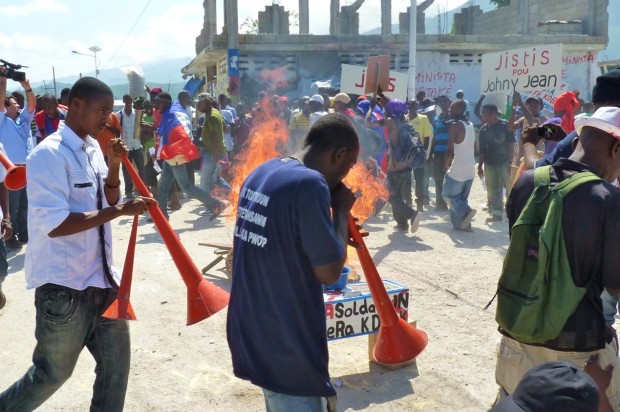 Fontes: Haiti Chery | zqxjkv0.blogspot.comportuguês) | Fotografias um e cinco dos arquivos da Presidencia de la Republica del Ecuador; dois, oito e nove do Blog Do Planalto; quatro, seis, sete e dez de United Nations Photo; três do APG Agencia; onze por Ansel.
Fontes: Haiti Chery | zqxjkv0.blogspot.comportuguês) | Fotografias um e cinco dos arquivos da Presidencia de la Republica del Ecuador; dois, oito e nove do Blog Do Planalto; quatro, seis, sete e dez de United Nations Photo; três do APG Agencia; onze por Ansel.

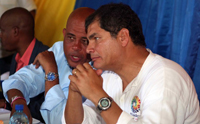
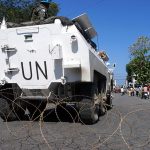



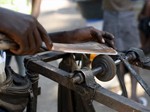
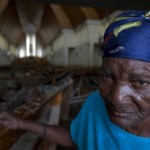
Comments
Et Tu, Brute? Haiti’s Betrayal By Latin America | Et Tu, Brute? Traição do Haiti pela América Latina — No Comments